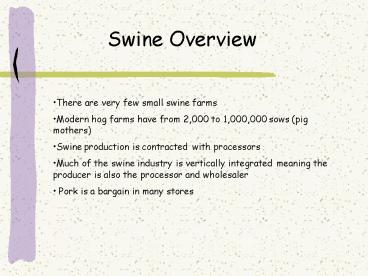Swine Overview PowerPoint PPT Presentation
1 / 32
Title: Swine Overview
1
Swine Overview
- There are very few small swine farms
- Modern hog farms have from 2,000 to 1,000,000
sows (pig mothers) - Swine production is contracted with processors
- Much of the swine industry is vertically
integrated meaning the producer is also the
processor and wholesaler - Pork is a bargain in many stores
2
Swine Overview
- We will discuss
- Breeding maternal and sire lines
- Grouping for weaning and growing
- Feeding sows, boars, growing pigs
- Disease control SEW/all-inall-out
- Finishing weight at harvesting
3
Swine Overview Yorkshire Maternal Line good
milkers
4
Swine Overview Landrace Maternal Line good
milkers
5
Swine Overview Berkshire Sire line
6
Swine OverviewChester White Sire line
7
Swine Overview Duroc Sire Line
8
Swine Overview Hampshire Sire and Maternal Line
9
Swine Overview Large White Composite Breed
10
Swine Overview Meishan Maternal line very large
litters
11
Swine Overview Poland China Sire line
12
Swine Overview Where are hogs raised ? Number
marketed year
Red 10,000,000 yr Yellow 1,000,000 yr
Green
13
Swine Overview Where are hogs raised ? Number
marketed year
Iowa due to corn North Carolina - due to lax
environmental laws
14
Swine Overview Production Units
Terms Pig a swine animal Gilt a female pig
that has not had its first offspring Sow- a
female pig that has had 1 or more litters Boar
an uncastrated male pig Barrow a castrated male
pig
15
Swine Overview Production Units
Pregnant sows are kept in individual stalls until
they farrow
16
Swine Overview Production Units
Sows can be individually fed and individual
records are kept on each sow
17
Swine Overview Production Units
Open nonpregnant sows may be kept in group pens
so they exhibit estrus some farms are now
housing pregnant sows in group pens.
18
Swine Overview Production Units
Sows farrow litters of between 10-16 pigs, but
can nurse only about 12, excess pigs are cross
fostered to sows that have less than 12 pigs
19
Swine Overview Production Units
Pigs are weaned (removed from the sow) at 18-21
days and segregated into nursery units of equal
size pigs SEW segregated early weaning AI-AO
all-in
20
Swine Overview Production Units
Pigs are fed special diets from self feeders and
are moved to larger groups at 7-10 weeks of age.
As pigs grow diets are changed and diets for
gilts differ from from diets of barrows or boars
21
Swine Overview Production Units
Manure from the facilities goes through slotted
floors and is flushed into lagoons the manure is
then used for crop fertilizer
22
Swine Overview Production Units
Buildings may be naturally ventilated with
windows or mechanically ventilated with fans
23
Swine Overview Production Units
Pigs may be fed free choice from self feeders or
feed may be regulated when animals are kept in
individual pens
24
Swine Overview Production Units
A piggy sow is one that is near farrowing, note
the large belly full of unborn pigs
25
Swine Overview Production Units
Boars are taught to mount an artificial sow and
semen is collected so sows can be bred
artificially
26
Swine Overview Production Units
A breeding technician collects semen from a boar
27
Swine Overview Production Units
A breeding pipette is inserted into the sows
cervix and the pipette has a cork screw end that
fits into the cervix, semen is injected through
the tube into the sows reproductive tract
28
Swine Overview Production Units
Boars may be kept in pens close to sows so they
are more likely to exhibit estrus
29
Pork leg Pork middle Pork shoulder Pork side
30
(No Transcript)
31
(No Transcript)
32
Swine Overview Future Production
1. Production units will become larger 2. Units
are vertically integrated 3. Export markets are
important 4. Margins will continue to be close 5.
Kentucky will see a decline in hog production

